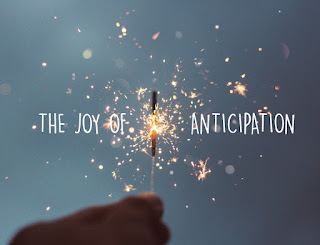This isn't my time of year. It has nothing to do with the weather. I rather like the cold, despite the fleeing from it so common among my geographical peers. My aversion has to do with the holidays. I hate to see them end. After righteously forestalling Christmas music until after Thanksgiving, we go into full aural saturation mode for the ensuing weeks. There follows decorating, partying, shopping, remembering and planning. But all the aforementioned fit neatly under the heading of "anticipating." And we do. We don't tend to think much about Christmas and New Year's throughout the rest of the year, but during the season of Advent and the celebration of Christmas we cram in a lot of anticipation. I won't speak for my beloved, but between the nostalgia of remembering and the giddiness of anticipating I spend the entirety of the season emotionally drunk on it all. We cook special meals, we wrap special presents, and the space beneath the tree grows crowded with its own visual manifestation of anticipation. Family logistics are coordinated, laced with still more anticipation. The house is readied, the beds are made, the party mix set out in a bowl, the cars pull into the driveway, and all the anticipation becomes present tense. Embodied. Incarnate, just to keep with the season.
And then...
And then the space beneath the tree is empty once again. The driveway is emptied. The beds are stripped and the sheets stuffed into the washer. The dishes are washed and the trash taken out. The few errant pieces of party mix are swept up, and the resident toys put away. There is an emptiness that remains; a silence, despite the instrumental Christmas songs lingering on the stereo. And a lump in my throat. It's a common problem with me. I'm prone to this kind of melancholy. As I have learned about personalities I've come to understand that different ones of us are oriented differently to time, and I tend to be oriented to the past - oftentimes to the neglect and detriment of the present and future. And "the past" is full in my heart as this morning labors to get underway, even if it is only a matter of days since we gathered around the tree; a matter of hours since we closed the door and waved goodbye. Melancholia. Perhaps even something of the "acedia" the ancients used to name. It is, for me, that odd - bizarre, even - intersection of gratitude, joy, contented happiness and profound sadness at the sudden "pastness" of it all; the completion of all that anticipation.
And then...
And then I read Henry Wadsworth Longfellow's poem, "The Meeting," the last few stanzas of which observe:
We speak of a Merry ChristmasAnd many a Happy New YearBut each in his heart is thinkingOf those that are not here.
We speak of friends and their fortunes,And of what they did and said,Till the dead alone seem living,And the living alone seem dead.
And at last we hardly distinguishBetween the ghosts and the guests;And a mist and shadow of sadnessSteals over our merriest jests.And I think to myself how lamentable that sounds. And that I would opt for a different spirit; that I would rather pay more attention to the guests than the ghosts; be mindful and appreciative of, and celebrate these present moments and and upcoming ones with those around and beside me instead of focusing mournfully on absentees.
And then...
And then I tuned in to Chris Botti singing his simple holiday song, "Perfect Day" on that lingering holiday playlist, and hear him say to his beloved, "With you by my side, it's gonna be a perfect day. How blest I've been that I can truly say, 'with you it's Christmas everyday.'
And I thought, "yes, indeed." That perfectly describes my good fortune. This day has much to savor, to experience, and yes, to anticipate. Tomorrow certainly will as well. There are wonderments in store of myriad descriptions over the coming months weeks and months, and I am excited by the thought of them - the wonderments, themselves, but also the ones with whom I will share them, and I dare not distract from them by simply remembering.
 These have been precious days, filled with precious moments, animated by people precious in my life. I will savor them, but I best not belabor them because this, too, will be a perfect day and I would hate to miss it. Botti has it right as far as I am concerned: spiritually, relationally, experientially, romantically, "it's Christmas everyday." The thought of it makes me smile.
These have been precious days, filled with precious moments, animated by people precious in my life. I will savor them, but I best not belabor them because this, too, will be a perfect day and I would hate to miss it. Botti has it right as far as I am concerned: spiritually, relationally, experientially, romantically, "it's Christmas everyday." The thought of it makes me smile. I think I'll put a few more things in the washing machine, and then go downstairs to exercise. After all, I need to stay healthy for all that's on the way - even Christmas, only 358 days away.
And then, perhaps, take a nap. I have some catching up to do.
